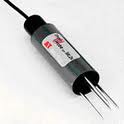Aug 17 2010
Gilbert Miller, who is heading the soil moisture monitor project at Clemson University’s Edisto Agricultural Research and Extension Center in Blackville, has pioneered a new soil moisture sensor.
It is a tool to optimize irrigation and to warn of plant stress at the dry or wet ends of the scale. The sensor will turn on the irrigation system when 15% of the essential moisture is depleted. Leaching will be very less due to frequent irrigation and hence less water is used.
 Soil moisture Sensors
Soil moisture Sensors
It features a multi-level capacity probe with dual frequency. It determines moisture in one frequency, while salinity and moisture can be measured in the other frequency. Also soil sensors will emit an electronic signal that can be received by cell phones. Irrigation can be carried out automatically or manually.
David Lankford, general manager of Earthtec Solutions, helped Miller in terms of acquiring grant money to conduct on-farm testing. According to him, once 15% of the moisture requirement of the plant in coastal plain soil is depleted, the sensor will enable the application of water in smaller dosage. This will be of great help since the water retention capacity of the soil is less than the daily moisture requirement.
In 2008, which was an extremely dry year in South Carolina, primary field tests were conducted on watermelons and vegetable crops. When water was applied on watermelons for the 15% empty condition, there was 50% sharp increase in yield per acre. It is due to the optimum application of water which the plant needed. Steady watering using moisture sensors was also practiced with cotton crops in Arkansas, which kept the plant free from stress and showed an increased yield from half bale to one bale.
By measuring the amount of water getting into the root zone, small amount of water is triggered by the sensor, thereby maintaining the required quantity of nutrients and water for the plant’s growth. Miller’s team also did a research on movement of water through the crop, moisture retention ability of the soil and their future work will be to verify it with real-life situations.